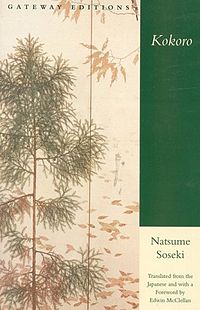- Kokoro
-
For other uses, see Kokoro (disambiguation).
Kokoro 
Author(s) Natsume Sōseki Original title Kokoro: Sensei no Isho Country Japan Language Japanese Publication date 1914 Kokoro (こゝろ, or in post-war orthography こころ) is a novel by the Japanese author Natsume Sōseki. It was first published in 1914 in serial form in the Japanese newspaper Asahi Shinbun. While the title literally means "heart", the word contains shades of meaning, and can be translated as "the heart of things" or "feeling". The work deals with the transition from the Japanese Meiji society to the modern era, by exploring the friendship between a young man and an older man he calls "Sensei" (or teacher). It continues the theme of isolation developed in Soseki's immediately preceding works, here in the context of interwoven strands of egoism and guilt, as opposed to shame. Other important themes in the novel include the changing times (particularly the modernization of Japan in the Meiji era), the changing roles and ideals of women, and intergenerational change in values, the role of family, the importance of the self versus the group, the cost of weakness, and identity.
During the novel's initial serial run, from April 20 to August 11, 1914, it was printed under the title Kokoro: Sensei no Isho ((心 先生の遺書 Kokoro: Sensei's Testament). When later published in novel form by Iwanami Shoten, its title was shortened to Kokoro; the rendering of the word "kokoro" itself was also changed from kanji (心) to hiragana (こゝろ).[citation needed]
Contents
Plot
The novel was written in 1914. It is set a few years previous and is divided into three parts. In the first part, Sensei and I, the narrator, a guileless university student, befriends an older man, Sensei (most of the characters' real names are not given). Sensei lives as a recluse, interacting only with his wife and the narrator, and occasional unseen visitors, but still maintaining a distance between himself and them. He regularly visits the grave of a friend, but for the moment refuses to tell the narrator any details of his earlier life.
In the second part, My Parents and I, the narrator graduates and returns to his home in the country to await his father's death. As his father lies dying, the narrator receives a letter from Sensei which is recounted in the third part of the novel, Sensei and His Testament. Sensei reveals that in his own university days he was cheated out of most of his fortune by his uncle. As a result he moved to Tokyo and began living with a widow and her daughter, with whom he fell in love. Later he convinced his childhood friend (known only as K), who was in dire straits, to move in with him. Gradually K recovered, but also fell in love with the landlady's daughter. K confessed this love to Sensei, who was shocked, and later full of jealousy. Sensei then proposed marriage, and shortly after, K committed suicide. Sensei, who had lost his faith in humanity after being cheated by his uncle, was horrified to find the same dark impulses lurking in his own heart, and felt a heavy guilt for the death of his friend. In the present, 1912, Sensei is prompted by the suicide of General Nogi Maresuke (following the death of the Meiji Emperor) to take his own life, writing the letter to his only friend to explain his decision.
Film adaptations
Kokoro has been adapted into at least two films. The first was released in 1955 and directed by celebrated filmmaker Kon Ichikawa. This film was released by the Masters of Cinema organization and is available on Region-2 DVD.[1]
The novel was also adapted into film in 1973, by director Kaneto Shindo.[2]
In addition, the novel was also adapted into a two-episode part of the Aoi Bungaku anime series, directed by Shigeyuki Miya.
References
- ^ "Masters of Cinema page for 1955 film". http://www.eurekavideo.co.uk/moc/catalogue/kokoro/. Retrieved 2009-10-08.
- ^ "IMDB page for 1973 film". http://www.imdb.com/title/tt0203630/. Retrieved 2009-10-08.
External links
- Kokoro (Translated by Edwin McClellan) at Google Books
Categories:- 1914 novels
- Novels by Natsume Sōseki
- Novels set in Japan
Wikimedia Foundation. 2010.
